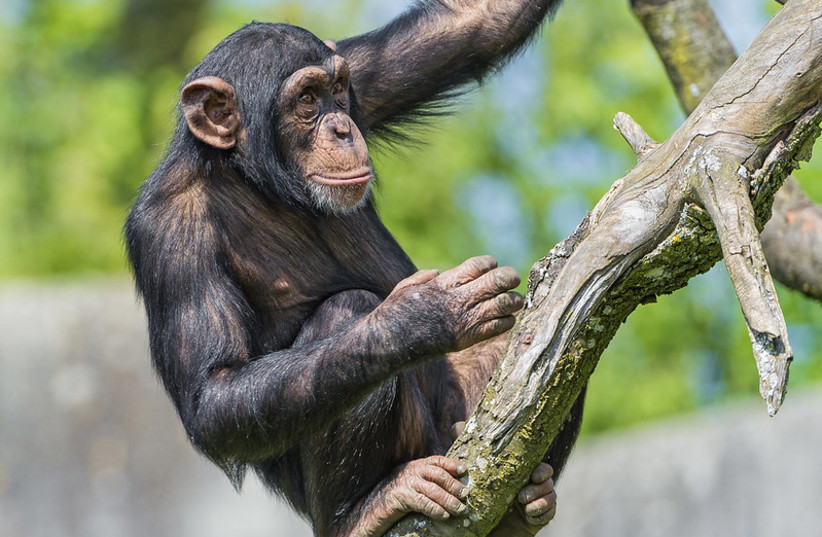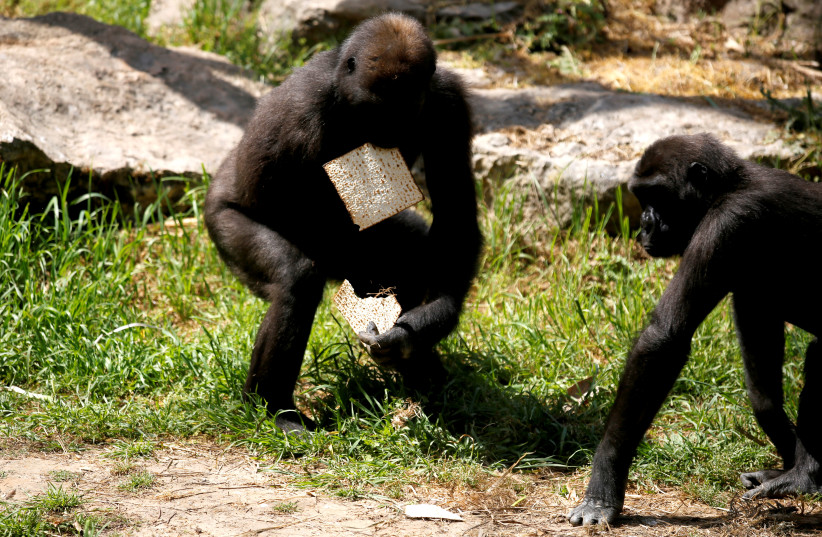Chimpanzees share human tendency to synchronize their steps with others - study
The study that was led by Dr. Manon Schweinfurth recorded the walking patterns of chimpanzees at the Chimfunshi Wildlife Orphanage Trust in Zambia.
Chimpanzees, which belong to a diverse group of primates that includes some 200 species, share a human tendency to unintentionally synchronize their steps when walking alongside other members of their own species. Researchers who observed them suggested that this therefore may be an ancestral trait.
It has already been discovered that chimps can coordinate when working toward a goal, such as pulling a string to release food, but much less is known about their propensity to coordinate spontaneously.
The study, led by Dr. Manon Schweinfurth – a lecturer in the School of Psychology and Neuroscience at St. Andrews in the UK – and just published under the title “Inter-individual coordination in walking chimpanzees” in the journal Current Biology recorded the walking behavior of chimpanzees at the Chimfunshi Wildlife Orphanage Trust, a sanctuary in Zambia, under a variety of conditions.
How did they conduct their study?
Humans, like many other living species, live in groups and coordinate actions with others in social settings. Such interpersonal coordination may emerge unconsciously and when the goal is not the coordination of movements, as when falling into the same rhythm when walking together. Although one of our closest living relatives, the chimpanzee (Pan troglodytes) shows the ability to succeed in complex joint action tasks where coordination is the goal, little is known about simpler forms of joint action.
A chimpanzee eats the traditional Matza (unleavened bread) in preparation for the upcoming Jewish holiday of Passover, at the Ramat Gan Safari Park near Tel Aviv (credit: AMIR COHEN/REUTERS)
The research team observed the chimpanzees when they were walking alone or when walking next to others under semi-natural conditions. They also assessed social relationships to investigate potential effects on the strength of coordination. When walking with members of the same species, individual chimps walked faster than when alone. The researchers conclude that chimpanzees adapt their individual behavior to temporally coordinate actions with others, which might provide a basis for engaging in other more complex forms of joint action. This spontaneous form of inter-individual coordination, often called entrainment, is thus shared with humans.
“Humans deliberately plan and coordinate actions with others during sports games, group dances, musical ensembles or military actions. But it is also part of our daily life – like carrying items together or getting a child dressed. Indeed, joint actions have been suggested to be crucial for our success as a species because much more can be achieved together than alone. In fact, we can’t help it and coordinate actions even when it is not necessary to do so, such as falling into the same rhythm with someone walking next to us,” wrote Schweinfurth.
The study involved both male and female chimpanzees of a variety of ages, some related and some unrelated. When the chimpanzees walked together, a step-by-one walker was followed by the same respective foot of the other walker in 79% of the cases within less than 0.5 seconds.
“This study provides evidence that this simple form of coordination is shared between humans and their closest living relatives. The difference in more complex forms of coordination between humans and chimpanzees is thus probably due to more sophisticated underlying mechanisms. Future studies are needed to identify those,” she concluded.
Chimpanzees are ‘just like us’ - BBC REEL
PG Tips Chimpanzee M.O.T. Test & Plumbers Funny TV AD
THIS PAGE WAS POSTED BY SPUTNIK ONE OF THE SPUTNIKS ORBIT BLOG
HTTPS://DISQUS.COM/HOME/FORUM/THESPUTNIKSORBIT-BLOGSPOT-COM/




No comments:
Post a Comment
Stick to the subject, NO religion, or Party politics